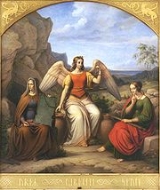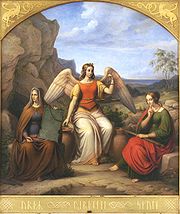
Verdandi
Encyclopedia

Norse mythology
Norse mythology, a subset of Germanic mythology, is the overall term for the myths, legends and beliefs about supernatural beings of Norse pagans. It flourished prior to the Christianization of Scandinavia, during the Early Middle Ages, and passed into Nordic folklore, with some aspects surviving...
, Verðandi (Old Norse
Old Norse
Old Norse is a North Germanic language that was spoken by inhabitants of Scandinavia and inhabitants of their overseas settlements during the Viking Age, until about 1300....
, meaning possibly "happening" or "present"), sometimes anglicized as Verdandi or Verthandi, is one of the norns
Norns
The Norns in Norse mythology are female beings who rule the destiny of gods and men, a kind of dísir comparable to the Fates in classical mythology....
. Along with Urðr
Urðr
Urðr is one of the Norns in Norse mythology. Along with Verðandi and Skuld , Urðr makes up a trio of Norns that are described as deciding the fates of people...
(Old Norse
Old Norse
Old Norse is a North Germanic language that was spoken by inhabitants of Scandinavia and inhabitants of their overseas settlements during the Viking Age, until about 1300....
"fate") and Skuld
Skuld (Norn)
Skuld is a Norn in Norse mythology. Along with Urðr and Verðandi , Skuld makes up a trio of Norns that are described as deciding the fates of people...
(possibly "debt" or "future"), Verðandi makes up a trio of Norns that are described as deciding the fates (wyrd
Wyrd
Wyrd is a concept in Anglo-Saxon culture roughly corresponding to fate or personal destiny. The word is ancestral to Modern English weird, which retains its original meaning only dialectally....
) of people.
Etymology
Verðandi is literally the present tense of the Old NorseOld Norse
Old Norse is a North Germanic language that was spoken by inhabitants of Scandinavia and inhabitants of their overseas settlements during the Viking Age, until about 1300....
verb "verða", "to become", and is commonly translated as "in the making" or "that which is happening/becoming"; it is related to the Dutch word worden and the German word werden, both meaning "to become".
Völuspá
She appears in the following verse from the Poetic EddaPoetic Edda
The Poetic Edda is a collection of Old Norse poems primarily preserved in the Icelandic mediaeval manuscript Codex Regius. Along with Snorri Sturluson's Prose Edda, the Poetic Edda is the most important extant source on Norse mythology and Germanic heroic legends, and from the early 19th century...
poem Völuspá
Völuspá
Völuspá is the first and best known poem of the Poetic Edda. It tells the story of the creation of the world and its coming end related by a völva addressing Odin...
, along with Urðr and Skuld:
|
|

